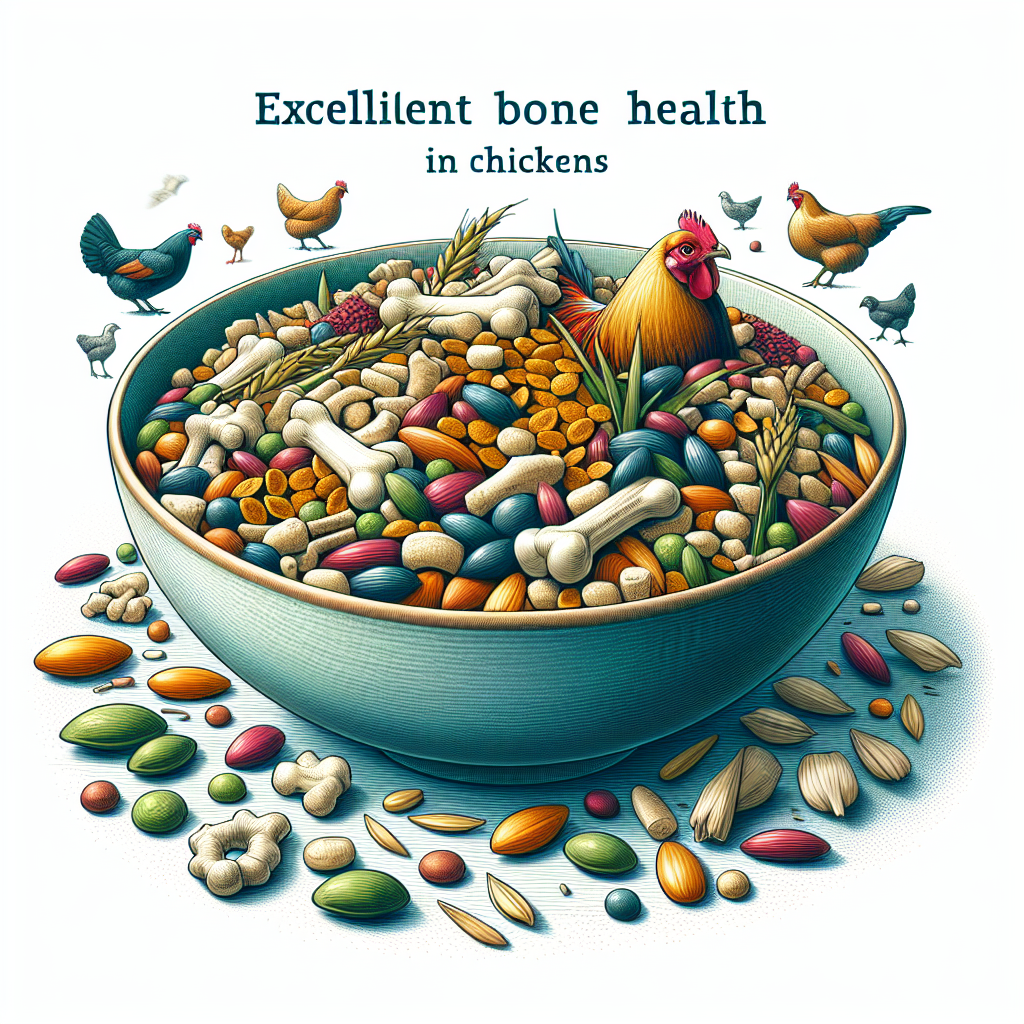If you’re a chicken owner looking to ensure strong bone health for your flock, the answer lies in providing them with the right nutrition. Just like humans, chickens require a balanced diet to maintain healthy bones. By understanding the essential nutrients chickens need and incorporating them into their feed, you can help promote optimal bone health and prevent common issues such as fractures and weak bones. In this article, we’ll explore the key nutrients that support bone health in chickens and discuss the proper feeding practices that can make a significant difference in their overall well-being.
Importance of Strong Bone Health in Chickens
Having strong bone health is crucial for chickens as it plays a vital role in their overall wellbeing and productivity. Just like humans, chickens rely on their bones for support, movement, and protection. Additionally, strong bones are essential for egg production and the growth and development of young chicks. Therefore, prioritizing and maintaining strong bone health should be a top priority for any chicken owner.
Role of Bones in Chicken’s Body
Bones serve several important functions in a chicken’s body. They act as a framework, providing structural support and enabling the chicken to stand, walk, and even fly. Bones also protect vital organs, such as the heart and lungs, from potential injuries. Furthermore, bones serve as a reservoir for essential minerals, including calcium and phosphorus, which are necessary for various physiological processes, such as muscle contraction and nerve transmission.
Risks of Poor Bone Health in Chickens
If a chicken’s bones are weak or brittle, it can lead to a range of health problems and complications. One common issue is the increased risk of fractures and injuries, as compromised bones are more susceptible to damage. Chickens with poor bone health are also prone to developing skeletal deformities, such as bowed legs or twisted beaks, which can negatively impact their mobility and ability to feed properly. Moreover, weak bones can significantly hinder egg production in laying hens, resulting in reduced productivity and potential financial losses for chicken owners.
Benefits of Strong Bone Health
Ensuring strong bone health in chickens yields numerous benefits. Chickens with robust and healthy bones are generally more active and agile, able to engage in natural behaviors like foraging and dust bathing. They have a reduced risk of bone fractures and injuries, allowing them to lead comfortable and pain-free lives. Additionally, strong bones positively impact the egg-laying capacity of hens, resulting in consistent and higher-quality egg production. By prioritizing strong bone health, chicken owners can promote overall welfare and productivity in their flocks.
Understanding Chickens’ Nutritional Needs
To maintain strong bone health in chickens, it is crucial to have a solid understanding of their nutritional requirements. Chickens require a well-balanced diet that provides all essential nutrients in the right proportions. Failure to meet these dietary requirements can lead to nutritional deficiencies, including those that directly impact bone health.
Overview of Chickens’ Dietary Requirements
Chickens have certain dietary requirements that must be met to support their bone health. They require a diet that is rich in protein, vitamins, minerals, and other essential nutrients. Protein is particularly crucial for bone health as it provides the building blocks necessary for bone formation and regeneration. In addition, chickens need a consistent supply of minerals such as calcium and phosphorus, which are the primary components of bone tissue.
Essential Nutrients for Bone Health in Chickens
Calcium and phosphorus are two of the most critical nutrients for maintaining strong bone health in chickens. Calcium is essential for bone mineralization, while phosphorus helps in the formation of the bone matrix. Both these minerals work together to ensure proper bone development and strength. Additionally, other nutrients like vitamin D, vitamin K, and magnesium play supporting roles in bone health. Vitamin D aids in calcium absorption, while vitamin K is involved in bone formation and remodeling. Magnesium contributes to the structural integrity of bones.
Factors that Impact Nutritional Needs
Several factors can affect a chicken’s nutritional needs and, consequently, its bone health. The age of the chicken is a significant factor to consider. Chicks have higher calcium and phosphorus requirements to support their rapid growth and skeletal development, while adult laying hens have increased calcium needs for eggshell production. Other factors that influence nutritional needs include the breed, size, and activity level of the chicken, as well as environmental conditions such as temperature and stress levels.
Feeding a Balanced Diet for Strong Bones
Providing chickens with a well-balanced diet is crucial for promoting strong bone health. A balanced diet ensures that chickens receive all the necessary nutrients in adequate amounts to support bone growth, maintenance, and repair.
Providing Adequate Protein
Protein plays a critical role in bone health by providing the necessary building blocks for bone tissue. Including high-quality protein sources in the chickens’ diet is essential. Good sources of protein for chickens include legumes, such as soybeans, and animal-based proteins like fishmeal or dried mealworms. Ensuring that chickens have access to sufficient protein promotes optimal bone development.
Calcium and Phosphorus Balance
Maintaining the right balance of calcium and phosphorus in the diet is crucial for strong bones. An imbalance in these minerals can lead to skeletal problems, including weakened bones and deformities. Calcium-rich foods, such as crushed oyster shells or ground limestone, can be provided to meet the chickens’ calcium needs. Ensuring an appropriate ratio of calcium to phosphorus is equally important, as excess phosphorus can inhibit calcium absorption. Commercial poultry feeds are formulated to maintain the correct balance of these minerals.
Supplementation for Optimal Bone Health
In some cases, supplementation may be necessary to ensure optimal bone health in chickens. This is particularly relevant for backyard chicken owners who formulate their own diets or have limited access to commercial feeds. A veterinarian or poultry nutritionist can provide guidance on supplementing the diet with specific nutrients, such as vitamins or minerals, to address any potential deficiencies and promote strong bone health.
Feeding Strategies for Chickens’ Bone Health
Different stages of a chicken’s life require specific feeding strategies to support optimal bone health. Whether it is feeding chicks, laying hens, or broilers, tailoring the diet to meet the specific needs of each stage is essential.
Feeding Chicks for Strong Bones
During the early stages of life, chicks require a diet that supports rapid growth and skeletal development. Commercial chick starter feeds are formulated to provide the necessary nutrients, including protein, vitamins, and minerals. These feeds typically contain higher levels of protein to support bone growth. Additionally, it is essential to provide appropriate living conditions, such as enough space and clean bedding, to minimize stress and promote overall health.
Feeding Laying Hens for Bone Health
Laying hens have specific calcium requirements to support eggshell production. It is important to provide a calcium-rich diet during this stage to prevent calcium depletion from the hen’s bones. Incorporating calcium-rich supplements, such as crushed oyster shells or ground limestone, into the hens’ diet is crucial. Ensuring that the hens have access to these calcium sources throughout the day promotes optimal eggshell quality and helps maintain strong bones.
Managing Diet for Broilers’ Bone Health
Broilers, chickens raised specifically for meat production, have a rapid growth rate and require careful management of their diet to support their bone health. Proper nutrition, including adequate protein and energy levels, is essential to ensure healthy bone development. Commercial broiler feeds are formulated to provide the necessary nutrients for optimal growth and bone health. Additionally, ensuring appropriate living conditions, such as sufficient space and proper ventilation, plays a role in minimizing stress and promoting strong bones in broilers.
Optimizing Calcium Absorption
While providing an adequate amount of calcium in the diet is important for strong bone health, optimizing its absorption is equally crucial.
Calcium Sources for Chickens
There are various calcium sources available for chickens. Crushed oyster shells, limestone, and eggshells are commonly used as calcium supplements. These sources provide a readily available form of calcium that chickens can consume to meet their calcium needs. It is important to choose a reliable source of calcium and ensure that it is clean and free from contaminants.
Avoiding Calcium Deficiency
Calcium deficiency can have severe consequences for chicken health, particularly for laying hens. It can lead to weak or thin eggshells, a condition known as shell quality problems. To avoid calcium deficiency, it is crucial to provide a consistent supply of calcium-rich foods or supplements in the diet. Monitoring eggshell quality and addressing any issues promptly can help prevent calcium deficiency in laying hens.
Enhancing Calcium Uptake
Vitamin D plays a significant role in enhancing calcium absorption in chickens. Exposure to natural sunlight allows chickens to produce vitamin D in their bodies. Therefore, providing opportunities for chickens to spend time outdoors and soak up sunshine can contribute to optimal calcium absorption. Alternatively, artificial UV lighting can be used to supplement vitamin D synthesis in chickens housed indoors or in areas with limited sunlight.
Minimizing the Risk of Bone Disorders
Bone disorders can significantly impact a chicken’s health and quality of life. Taking preventive measures to minimize these risks is crucial for ensuring strong bone health.
Preventing Rickets in Chickens
Rickets is a skeletal disorder characterized by soft and weakened bones. It commonly occurs in young chicks and growing chickens. Inadequate calcium, phosphorus, or vitamin D in the diet can contribute to the development of rickets. To prevent rickets, it is essential to provide a well-balanced diet that meets the nutritional needs of growing chickens. Ensuring proper exposure to natural sunlight or providing artificial UV lighting can also help prevent vitamin D deficiency-associated rickets.
Addressing Osteoporosis in Laying Hens
Osteoporosis is a condition characterized by brittle and weak bones, commonly observed in laying hens. It can lead to bone fractures and decreased egg production. To address osteoporosis in laying hens, it is crucial to provide a calcium-rich diet and maintain appropriate calcium to phosphorus ratios. Additionally, ensuring adequate weight management and minimizing stress levels in the flock can contribute to preventing osteoporosis in laying hens.
Managing Leg Health and Lameness
Leg health and lameness are significant concerns in poultry production. They can be caused by various factors, including poor bone health and improper nutrition. Maintaining good litter quality, providing appropriate perches and spaces for resting, and avoiding overcrowding can help minimize the risk of leg problems. Additionally, ensuring proper nutrition, including sufficient levels of protein, vitamins, and minerals, can contribute to stronger bones and reduce the risk of lameness.
Balancing Nutritional Considerations
Maintaining optimal bone health in chickens requires carefully balancing nutritional considerations to meet their specific needs and promote overall health and productivity.
Relationship Between Diet and Eggshell Quality
The diet of laying hens directly influences the quality of their eggshells. Proper nutrition, particularly adequate calcium intake, is essential for the production of strong and high-quality eggshells. A calcium-deficient diet can result in thin or weak eggshells, making them more prone to breakage. Ensuring a sufficient supply of calcium-rich foods or supplements in the hens’ diet helps maintain optimal eggshell quality and minimizes the risk of shell-related problems.
Weight Management and Bone Health
Maintaining a healthy weight is crucial for promoting strong bone health in chickens. Both underweight and overweight chickens are at a higher risk of skeletal problems. Underweight chickens may lack essential nutrients necessary for bone development, while overweight chickens may experience excessive stress on their bones and joints. Implementing weight management strategies, such as feeding appropriate portion sizes and promoting regular exercise, helps maintain an optimal weight and ensures healthy bones.
Balancing Nutritional Requirements with Costs
Providing a well-balanced diet for chickens can come with additional costs, particularly when sourcing high-quality feed or supplements. Chicken owners need to strike a balance between meeting nutritional requirements and managing associated expenses. It is important to evaluate the cost-effectiveness of different feed options, considering the nutritional value they provide. Consulting with poultry nutrition experts can help identify suitable feeding strategies that optimize bone health while staying within budget constraints.
Feeding Regimen and Schedule
Establishing a proper feeding regimen and schedule is essential to ensure chickens receive adequate nutrition for bone health.
Providing Continuous Access to Fresh Water
Chickens require access to fresh and clean water at all times. Water is critical for digestion, nutrient absorption, and overall hydration. Adequate water intake supports optimal bone health, as it helps transport nutrients to the bones and aids in cellular processes related to bone maintenance. Regularly monitoring and refilling water sources is crucial to ensure chickens have continuous access to fresh water.
Establishing a Feeding Schedule
A consistent feeding schedule helps maintain a stable environment for chickens and allows them to establish regular eating patterns. Providing feed at regular intervals promotes healthy digestion and consistent nutrient uptake, contributing to overall bone health. Feeding schedules can vary depending on factors such as the age, breed, and purpose of the chickens. It is important to consult with poultry experts or follow recommended guidelines to establish an appropriate feeding schedule for the specific flock.
Considerations for Free-Range Chickens
For chicken owners who raise free-range chickens, additional considerations may be necessary to ensure optimal bone health. Free-range chickens have the opportunity to forage for insects, seeds, and greens, which can contribute to a more varied and nutrient-rich diet. However, it is important to ensure that they have access to a proper balance of essential nutrients, including calcium, phosphorus, and protein. Monitoring their foraging behavior and supplementing their diet if necessary helps promote strong bones and overall wellbeing.
Monitoring and Evaluating Bone Health
Regular monitoring and evaluation of bone health in chickens is vital to identify any potential issues and make necessary adjustments to their diet and management practices.
Signs of Poor Bone Health
There are several signs that can indicate poor bone health in chickens. These include reduced mobility, lameness, difficulty standing or walking, skeletal deformities, and fractures. If any of these signs are observed, it is crucial to evaluate the chickens’ diet, living conditions, and overall health to identify and address the underlying issues affecting their bones.
Evaluating the Efficacy of Diet
Regularly assessing the efficacy of the chickens’ diet is important to ensure it is providing adequate nutrition for bone health. Monitoring their overall health, egg production (in the case of laying hens), and observing any signs of poor bone health can help determine if adjustments need to be made to the diet. Consulting with poultry nutrition experts or veterinarians can provide valuable insights and guidance in evaluating the diet’s efficacy and making appropriate modifications.
Importance of Regular Veterinary Check-ups
Regular veterinary check-ups are essential for maintaining optimal bone health in chickens. Veterinarians can assess the overall health of the flock, including their bone health, provide guidance on diet and management practices, and address any potential health issues. Regular check-ups help identify and address problems at an early stage, minimizing the impact on bone health and ensuring the long-term wellbeing of the chickens.
Conclusion
Strong bone health is crucial for the overall wellbeing and productivity of chickens. By understanding their nutritional needs and implementing appropriate feeding strategies, chicken owners can promote strong bones and minimize the risk of bone disorders. Providing a well-balanced diet, optimizing calcium absorption, and addressing specific nutritional requirements at different life stages are key factors in enhancing bone health. Regular monitoring, evaluation, and veterinary check-ups ensure that any issues affecting bone health can be addressed promptly. By prioritizing strong bone health, chicken owners contribute to the overall welfare and longevity of their flocks.




